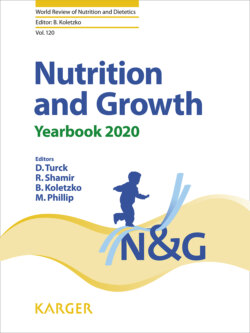Читать книгу Nutrition and Growth - Группа авторов - Страница 15
На сайте Литреса книга снята с продажи.
Plasma C-Type Natriuretic Peptide: Emerging Applications in Disorders of Skeletal Growth
ОглавлениеEspiner E1, Prickett T1, Olney R2
1Department of Medicine, University of Otago, Christchurch, Christchurch, New Zealand; 2Division of Endocrinology, Nemours Children’s Specialty Care, Jacksonville, FLA, USA
Horm Res Paediatr 2018;90:345–357
Abstract: Although studies in experimental animals show that blood levels of C-type natriuretic peptide (CNP) and its bioinactive aminoterminal propeptide (NTproCNP) are potential biomarkers of long bone growth, a lack of suitable assays and appropriate reference ranges has limited the application of CNP measurements in clinical practice. Plasma concentrations of the processed product of proCNP, NTproCNP – and to a lesser extent CNP itself – correlate with concurrent height velocity throughout all phases of normal skeletal growth, as well as during interventions known to affect skeletal growth in children. Since a change in levels precedes a measurable change in height velocity during interventions, measuring NTproCNP may have predictive value in clinical practice. Findings from a variety of genetic disorders affecting CNP signaling suggest that plasma concentrations of both peptides may be helpful in diagnosis, provided factors such as concurrent height velocity, feedback regulation of CNP, and differential changes in peptide clearance are considered when interpreting values. An improved understanding of factors affecting plasma levels, and the availability of commercial kits enabling accurate measurement using small volumes of plasma, can be expected to facilitate potential applications in growth disorders including genetic causes -affecting the CNP signaling pathway.
______________________
